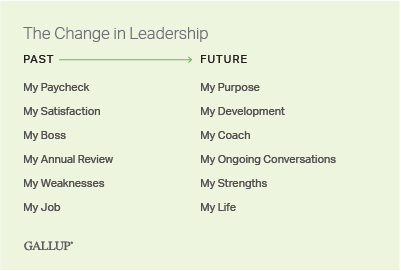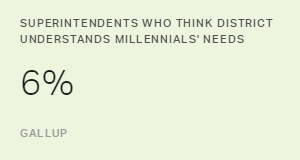Story Highlights
- Most new teachers are millennials
- School leaders need to understand millennials' work needs
- Gallup has found six key changes to workplaces
As students across the U.S. returned to school this fall, they discovered lots of new faces -- and not just among their peers. In the past few years, millions of new teachers have joined the workforce.
Most of these new teachers fall into a much-discussed but often misunderstood group: the millennial generation. Those teachers pose a major challenge for school leadership.
A recent Gallup study of 1,733 public school superintendents found that just 6% of these educational leaders strongly agree that their school district understands the needs of millennials in the workplace.
There are approximately 73 million millennials in the U.S. between the ages of around 19 and 36, representing those born between 1980 and 1996. Overall, millennials make up about 38% of the U.S. workforce, and they certainly make up a majority of its newly hired teachers.
This generation of employees is changing the workplace, and it is imperative that school and district leaders are aware of what it takes to ensure that these employees -- and all employees -- are set up for success.
Characteristics of Millennials
The Gallup report, How Millennials Want to Work and Live, took an in-depth look at the millennial generation. Millennials have been described as:
- Unattached: Millennials are less likely to be affiliated with traditional institutions such as political parties or organized religion. They are also less likely to be engaged in the workplace (just 29%) and are more likely to be ambivalent (55% "not engaged") compared with those from older generations.
- Connected: These digital natives have grown up with technology, changing the way they access information and make purchases, and transforming the very makeup of their social networks.
- Unconstrained: Millennials don't accept the old adage, "That's the way it has always been done." Instead, they push for change in the marketplace and the workplace. They see their work and life as more closely intertwined than older generations did, and they seek managers who care about them as employees and as people.
- Idealistic: Millennials are optimistic and search for work that fuels their sense of purpose and makes them feel important. If this doesn't seem likely in their current jobs, they're open to switching employers to obtain the kinds of jobs that align best with their future goals.
While the millennial generation is highly educated, nearly two-thirds of recent college graduates took out student loans. These decisions have left a median debt burden of approximately $30,000 per student, which influences millennials' major life decisions. About half of recent graduates with debt have postponed further training or postgraduate education because of their student loans. Millennials are delaying marriage and children more than previous generations have, and nearly one in seven millennials aged 24 to 34 are living at home with their parents.
What Millennials Want in the Workplace
As with millennials generally, teachers from this generation are entering the workplace looking for managers who work with them to set clear goals and priorities. They desire constant communication and feedback and to consistently be held accountable. In many ways, they want to be known -- to have a manager who understands who they are when they're at their best and who coaches them to understand and capitalize on their strengths.
Leadership is changing, in part, because of the vast number of millennials entering the workplace. Gallup finds six key workplace changes:
- Purpose: Rather than seeing work solely as a way to make financial ends meet, millennials seek meaningful work that provides them with a sense of purpose.
- Development: In recent years, employers have tried to satisfy employees with a variety of perks, from on-site dry cleaning to rock-climbing walls. The workplace of the future is moving away from these attempts to simply satisfy employees and instead prioritizes opportunities for employees to learn and grow and develop their full potential.
- Coach: Workplaces of the past were led by bosses who often used command and control as attempts to motivate employees. The future will have teams led by coaches who guide and partner with employees to achieve goals.
- Ongoing Conversations: Annual performance reviews are no longer sufficient; the workplace of the future will involve real-time and continuous communication and feedback.
- Strengths: The traditional approach of fixing what's wrong with people will be replaced with a focus on developing what's right with people -- building on their strengths.
- Life: Gallup has discovered that what the world wants is a good job. The workplace of the future will be made up of employees who are seeking to align their identities and lifestyles with organizations that help them maximize their contribution and thrive in their overall lives.

Few of the nation's superintendents feel confident about their school districts' preparedness for the entrance of millennials into the workplace. Millennials are not just changing the world of work for the future -- they are rapidly becoming the majority in today's workplace. School leaders need to better understand these changes and effectively lead teams of all generations in an effort to create great places to work for employees and great places to learn for students.
